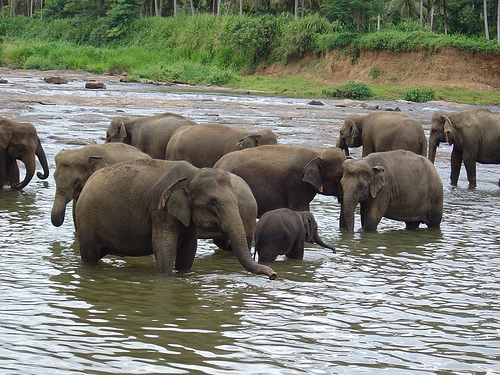Eco-Trips Aide the Revitalization of Sri Lanka’s Elephant Population
 March 9, 2009
March 9, 2009  Kyriaki (Sandy) Venetis
Kyriaki (Sandy) Venetis  Pinnawela elephant orphanage. Photo courtesy of Flickr.com
Pinnawela elephant orphanage. Photo courtesy of Flickr.com
PINNAWELA, Sri Lanka - Eco-tourism in Sri Lanka is thriving, according to the Sri Lanka Tourism Promotion Bureau, which in turn is also providing a much needed boost to the country’s elephant conservation and breeding projects.
“The elephant population in Sri Lanka was being decimated to near extinction by the natural loss of their habitat, the hunting due to the lucrative ivory trade, and lack of proper management,” said Dileep Mudadeniya., SLTPB Managing Director, adding “but all that is history now.
“From merely seven elephants in 1975, the Pinnawela elephant orphanage now houses 65 elephants, including several bred in captivity, under the intelligent management of the National Zoological Gardens.” The elephants roam free in the 25-acre coconut plantation where they eat grass in addition to a daily diet of coconut palm, jackfruit, and other leaves, says the bureau, adding that the baby elephants at the orphanage are bottle fed on milk by their handlers.
The bureau further expresses its belief that the elephant orphanage at Pinnawela is one of the few places in the world where visitors could see at close quarters a large number of elephants roaming freely. It was estimated that Sri Lanka had a population of 30,000 elephants in 1815 and that number had dwindled to near extinction by the time the elephant orphanage was established in 1975, according to bureau data, adding that since then, the population has gradually increased to over 3,000 in the island nation.
“The Pinnawela orphanage is a classic example of sustainable tourism because it meets the needs of present tourists and the villagers simultaneously,” remarked Mr. Mudadeniya, further adding that “the Pinnawela site is a regular tourist attraction that provides a meaningful experience to the tourists, raises awareness about sustainability and promotes sustainable tourism practices.”
 eco-tourism | tagged
eco-tourism | tagged  Pinnawela Elephant Orphanage,
Pinnawela Elephant Orphanage,  Sri Lanka,
Sri Lanka,  eco-tourism,
eco-tourism,  elephants
elephants 